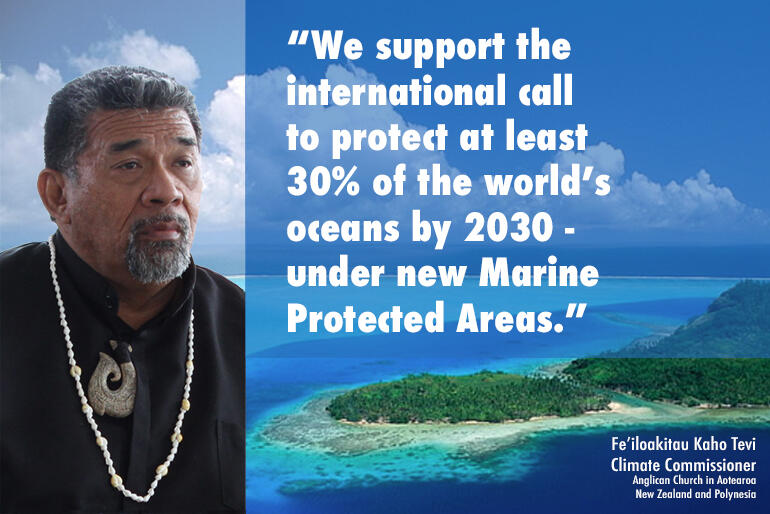
Climate Commissioner for the Anglican Church in Aotearoa, New Zealand and Polynesia, Fe'iloakitau Kaho Tevi has shared this Church's concern for the health and conservation of the oceans which make up so great a portion of our province, and impact so strongly on the lives of people this Church serves.
The Anglican Climate Commissioner's statement for World Oceans Day is led by this Church's call to care for God's Creation, particularly through its understanding of Moana theology, which for many years has led this Church's engagement with climate resilience and climate justice advocacy.
The statement for World Oceans Day 2025 follows in full below.
The Anglican Church in Aotearoa, New Zealand and Polynesia
Te Hāhi Mihinare ki Aotearoa, ki Niu Tīreni, ki Ngā Moutere o te Moana Nui a Kiwa
Climate Commissioner Statement
6 June 2025
Anglican Church in Aotearoa New Zealand and Polynesia Advocates for Ocean Protection and Deep-Sea Research on World Oceans Day
On the occasion of World Oceans Day, the Anglican Church in Aotearoa, New Zealand, and Polynesia reaffirms its unwavering commitment to ocean justice, conservation, and the theological imperative of creation care. This year’s theme resonates deeply with our Church’s spiritual and ecological identity: the Pacific Ocean—our Moana—is both life-giving and hope-giving.
Drawing on the recent Charge of Archbishop Sione Uluilakepa, the Church recognises the ocean not merely as a resource but as a sacred inheritance, central to Pacific identity and theological reflection. As articulated in the Charge, the Moana is a site of lamentation and renewal—a source of sustenance, resilience, and divine promise. In light of the mounting threats from climate change, pollution, and industrial overexploitation, we are called to act in faithful stewardship.
Through its Climate Change Commission, the Anglican Church in Aotearoa New Zealand and Polynesia supports the international call to protect at least 30% of the world’s oceans by 2030 through the establishment of Marine Protected Areas (MPAs).
MPAs are not only environmental safeguards; they are spiritual investments in the healing and restoration of God’s creation from the long-term impacts of industrial fishing, extractive economies, and ecological neglect.
At the same time, we support the continuation of scientific deep-sea research across the Exclusive Economic Zones (EEZs) of Pacific Island Countries, whilst at the same time we strongly advocate for a pause on all deep-sea mining activities.
This dual commitment reflects a theological ethic grounded in discernment and responsibility. The pause represents a necessary moral safeguard, ensuring that no irreversible harm is inflicted upon deep-ocean ecosystems before adequate knowledge is acquired. Through careful research and exploration, we honour the mystery of the deep, acknowledging it as part of God’s wondrous and still unfolding creation.
Archbishop Uluilakepa reminds us, "Our Pacific Ocean, Moana, is not merely a resource to be exploited; it is a sacred entity providing life, sustenance, and hope to countless communities across our region. As stewards of this precious gift, our duty extends beyond preservation—it calls us to restoration and rejuvenation."
On this World Oceans Day, we urge communities of faith, civil society, governments, and global actors to embrace a vision of the ocean rooted in reverence, justice, and regeneration. As we prepare for the upcoming United Nations Ocean Conference (UNOC 3) in Nice, France, we have a critical opportunity to elevate both the moral and scientific imperatives for ocean protection.
With its theme focused on scaling up ocean action through science and innovation, UNOC 3 aligns with our Church’s call to safeguard the Moana through care, equity, and intergenerational responsibility.
Let us move from lamentation to hope, from degradation to healing, and from extraction to restoration.

















Comments
Log in or create a user account to comment.